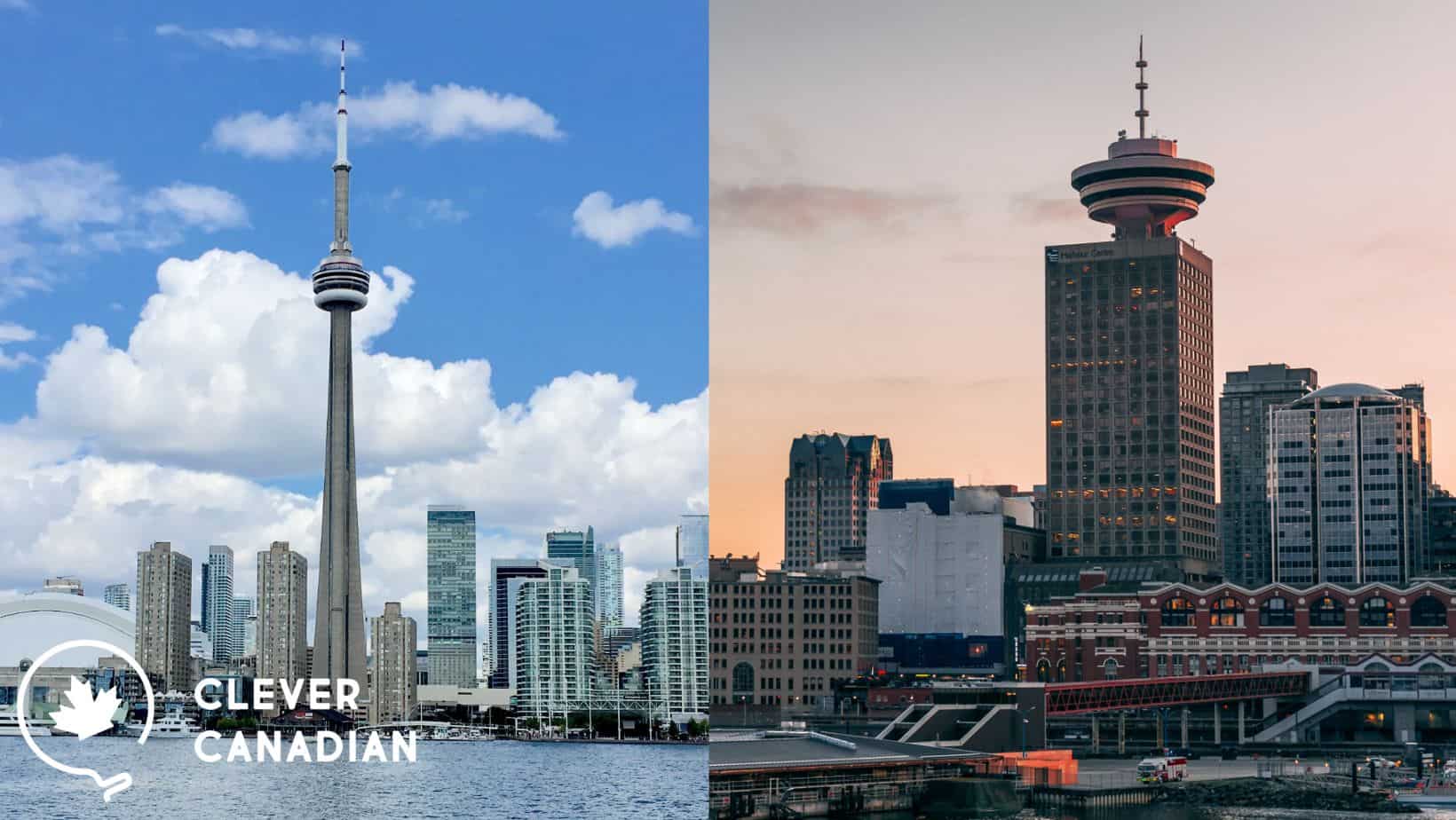Categories > Guides and Tips

Toronto vs Vancouver: Which is better for immigrants?
Canada is an attractive place to move into. It’s well-known for its quality education and job opportunities, making it a great place for families.
Two popular cities for immigrants are Toronto and Vancouver. Both have diverse communities and opportunities, but which is a better place for foreigners to live in?
Toronto and Vancouver both have diverse communities and large populations of different nationalities.
Both are expensive cities, but Vancouver is 22% pricier in monthly utilities than Toronto and 103% higher in housing than the Canadian average.
If you want to know more, then let’s dig in!
Cost of Living: Toronto vs Vancouver

Toronto and Vancouver are Canada’s two most expensive cities. Expect costly monthly bills for these two.
Vancouver is pricier when it comes to food, transportation (including car costs), utilities, and housing. Meanwhile, Toronto has more expensive childcare costs.
In monthly utilities, Vancouver is 22% pricier than Toronto. The former also has more expensive housing costs of about 33% more than the latter.
Canada is an attractive place for immigrants to move to. Some provinces, like Ontario and British Columbia, are more popular, too!
Toronto and Vancouver are two cities in these provinces that are appealing to many immigrants. They’re pretty great, so it’s not surprising!
But is it worth it to move (Is moving to Canada a good idea?) to Toronto or Vancouver? Well, that will depend on your lifestyle and job because these cities are not affordable!
It’s no secret that Toronto and Vancouver are expensive cities in Canada. The housing, food, and household utility bills are pricier compared to other urban areas in the country.
Toronto is known to locals and outsiders for being a costly place to live. Granted, it’s cheaper than New York, but that doesn’t mean Torontonians aren’t struggling with the rising prices right now.
In fact, Mercer’s Cost of Living City Ranking in 2022 ranked Toronto as the most expensive city in Canada! No wonder the prices of everything were so high!
In addition, Ontario’s capital city ranked 89th globally. Coming in at the 108th spot is Vancouver, making it the second most expensive city in Canada (but it’s trying to outrank Toronto).
Mercer calculated the data based on inflation, housing, food, utilities, transportation, and currency fluctuations. To give you a closer look, we made a table of Canada’s cities with the highest cost of living.
| Mercer’s 2022 Cost of Living City Ranking | |||
| Canada Ranking | Global Ranking | City | Province |
| 1 | 89 | Toronto | Ontario |
| 2 | 108 | Vancouver | British Columbia |
| 3 | 125 | Montreal | Quebec |
| 4 | 132 | Ottawa | Ontario |
| 5 | 141 | Calgary | Alberta |
Now that we know that Toronto and Vancouver are both expensive places, how much do you need to spend on a monthly basis for basic needs?
According to Living Cost, a family of four must spend an average of $5,264 every month while living in Toronto. Meanwhile, Vancouver’s just slightly cheaper at $5,237.
But that’s just a 0.51% difference, which is only $27! It’s safe to say that Toronto’s and Vancouver’s cost of living difference is almost nothing.
But let’s break it down to the basic factors you will need to spend the most on: food, housing, and transportation.
Living Cost’s data reveals that the monthly rent for families is $2,340 in Toronto, while it’s $2,421 in Vancouver. In contrast, a single person spends an average of $1,436 and $1,480, respectively.
These rent prices are almost the same, and with the continuously rising cost of housing, they might as well be. These costs are significantly affecting low and middle-income families in Canada.
In fact, Canadians are being forced to move to other provinces just to afford shelter. The rent prices in Toronto keep on rising, with some landlords increasing it to $2,400 a month for a small space of 500 sq ft.
Moreover, it’s the same in Vancouver. CityNews reported that Metro Vancouver residents, in particular, spend about 50% of their income on rent alone.
Food and utilities have the same issue. The costs to go to the grocery or pay your monthly energy bills are incredibly high, especially for low and middle-income households.
Furthermore, it’s expected for food prices to rise this year. The forecast is a jump of $1,000 for a typical yearly food bill!
Here’s a table we compiled to give you a better look at the basic monthly expenses in Toronto and Vancouver for a couple and a family of four, according to the gathered data of WOWA.
| Average Prices of Monthly Expenses | ||
| Category | Toronto | Vancouver |
| Couple | ||
| Utilities* | $1,952.75 | $2,120.50 |
| Food | $795.83 | $812.67 |
| Transportation** | $577.92 | $649 |
| Family of Four | ||
| Utilities* | $3,814.75 | $4,784.50 |
| Food | $1,691.67 | $1,625.33 |
| Transportation** | $577.92 | $649 |
| Childcare | $2,500 | $1,870 |
*includes rent, electricity, phone, and internet, **transportation passes and the cost of a car
Now, here is a table for the prices of goods and services in Toronto and Vancouver to give you a closer look for comparison.
| Prices of Goods and Services | ||
| Category | Toronto | Vancouver |
| Eating Out | ||
| Lunch Menu | $14.90 | $16 |
| Restaurant Dinner for 2 | $65.80 | $68.50 |
| Fast Food Meal | $9.29 | $9.06 |
| Beer in a Pub | $5.76 | $5.55 |
| Groceries | ||
| Milk, 1 litre | $2.66 | $2.19 |
| Bread, 0.5 kg | $2.42 | $3.08 |
| Rice, 1 kg | $2.68 | $3.08 |
| Eggs, 1 dozen | $3.27 | $4.02 |
| Cheese, 1 kg | $12.8 | $13.20 |
| Chicken Breast, 1 kg | $12 | $13.10 |
| Apples, 1 kg | $3.36 | $3.20 |
| Banana, 1 kg | $1.24 | $1.39 |
| Potato, 1 kg | $2.62 | $2.67 |
| Others | ||
| Doctors Visit | $60.40 | $129 |
| Gym Membership | $43.60 | $41.80 |
As you can see from the tables above, Vancouver is slightly higher priced than Toronto. But these small price changes are expected to rise in the coming months or years, making them almost the same or even edging out each other.
These prices may depend on the brands and kinds, though. But with the rising costs of goods and services in Canada, locals and immigrants may need to check the price tag before putting items in their cart.
As a matter of fact, many Canadians have even been forced to purchase store brands and foods with near-expiry dates to save more money.
This daily struggle affects many Canadians. Sadly, that also means the inflation crisis will also affect immigrants coming into the country because some will have to start at entry-level jobs.
As far as settling down your roots in Canada, it’s important to make smart investments because it’s going to cost a tonne of money to buy a detached home in Vancouver and Toronto! It’s essential to do your research before buying a home in Canada (What should I know before buying a house in Canada?).
According to WOWA, a detached home in the Greater Toronto Area will cost you $1,468,651! What’s even more shocking is the price in Greater Vancouver at $2,168,938! *gulp*
Who can afford these, really? To shock you even more, here are the average house prices in Toronto and Vancouver with the data from WOWA.
| Average Sold Prices of Homes in Toronto and Vancouver | |||
| Location | Detached Home | Townhouse | Condo Apartment |
| Greater Toronto Area | $1,468,651 | $1,036,571 | $703,566 |
| Greater Vancouver | $2,168,938 | $1,198,837 | $786,362 |
Toronto is known for having some of the most expensive house prices in Canada. It still does, but it seems Vancouver wants to take the throne for being pricier than Toronto.
The average cost of a detached home in Greater Vancouver is very high, reaching an average sold price of up to $2,168,938. That’s over twice as much as the Canadian average of $686,371!
In contrast, a detached home in the Greater Toronto Area can get up to $1,468,651. That’s still almost double the price compared to the Canadian average.
Job Opportunities in Toronto vs Vancouver

Toronto and Vancouver offer plenty of job opportunities. But Toronto has more options because it is a business and financial hub.
Toronto also has a higher minimum wage and average yearly income than Vancouver. Effective October 1, 2023, it will increase to $16.55, compared to Vancouver’s $15.65.
When it comes to job opportunities, Vancouver and Toronto have plenty to offer. But one just has more than the other.
Toronto is an ideal place for immigrants looking for employment because it offers many opportunities as Canada’s business and financial hub. It even has North America’s second-largest financial services centre.
That doesn’t mean that Vancouver doesn’t offer job opportunities. There are just more options in the fast-paced city of Toronto, not to mention the higher average salary.
Even so, immigrants won’t find it impossible to get a job in Canada. In fact, the country has plans to welcome about 500,000 immigrants each year by 2025.
This plan is to bring in more workers and residents in the country. Canada has an aging population, with Statistics Canada forecasting that almost 25% will be 65 and older in 2051.
Moreover, the country’s aging population problem means more job openings due to retirement. There is also a demand for personal support workers to provide professional care services to senior citizens.
In addition, the retirement crisis will also affect many sectors because of the labour shortage. It’s even predicted that millennials will surpass baby boomers in population by the end of this decade, making room for more immigrants to enter the country.
Average Salary in Toronto vs Vancouver

Vancouver has a lower minimum wage and generally has less average income than Toronto. That can vary, of course, depending on the position, experience level, and sector.
But on average, Torontonians just slightly earn more than Vancouverites. According to a report by WOWA, Toronto’s average yearly salary is $52,700, while Vancouver’s is $52,600.
Although that looks like a small difference, an extra $100 is necessary for this economy. That could be put in your savings!
As for the minimum wage, Ontario edges out British Columbia. It’s $15.65 per hour for BC residents, while Ontario is $15.50.
However, effective October 1, 2023, Ontario will increase the minimum wage to $16.55. So in the salary category, Toronto wins, despite the small (but important) difference.
| Minimum Wage | |
| Ontario | British Columbia |
| $15.50 | $15.65 |
| $16.55 (effective October 1, 2023) | — |
Diversity in Toronto vs Vancouver

Toronto and Vancouver are highly diverse cities with many Asian and Black communities. Both have large populations of immigrants from China, the Philippines, and India.
Additionally, there are diverse communities and organizations providing help and resources to immigrants of different ethnicities and religions.
However, there are still anti-Asian and anti-Black hate crimes in these cities. During the first year of the COVID-19 pandemic, anti-Asian hate crimes notably increased.
Toronto and Vancouver are both known for multiculturalism. The two Canadian cities have plenty of diverse communities, making them good choices for immigrants.
But the question here is, which city is more diverse or immigrant-friendly?
Toronto has an estimated population of 2.7 million, with 47% noting they are part of a visible minority. The City of Toronto’s 2016 census showed that 10% of the population in the city was born in China.
For a closer look, check the table we compiled below using Statistics Canada’s 2021 Census of Population. The following countries are selected birthplaces for immigrants with the most population in Toronto and Vancouver.
| Birthplaces for Immigrants with the Most Population | |
| Country | Total Population |
| TORONTO | |
| Philippines | 132,980 |
| China | 129,755 |
| India | 102,155 |
| Jamaica | 42,650 |
| Hong Kong | 36,850 |
| Italy | 37,700 |
| United Kingdom | 35,585 |
| Portugal | 34,360 |
| Vietnam | 31,675 |
| Guyana | 31,025 |
| VANCOUVER | |
| China | 63,270 |
| Philippines | 29,925 |
| Hong Kong | 25,485 |
| India | 14,640 |
| United Kingdom | 12,895 |
| Vietnam | 12,115 |
| Taiwan | 9,865 |
| United States of America | 9,790 |
| South Korea | 6,495 |
| Mexico | 3,870 |
As you can see above, Toronto and Vancouver both have large Asian communities, primarily from China, the Philippines, and India.
In fact, 198,040 people from 2016 to 2021 landed in Canada as immigrants or earned permanent resident status, while Vancouver had 41,355.
But enough about the numbers. What about the friendliness of the communities? How is it living as an immigrant in these cities?
Well, Toronto is one of the most diverse communities that many immigrants choose to live in. It’s also a popular destination for international students due to the top-ranking schools.
In Toronto, you will find many organizations providing support and resources for the Asian community. There are numerous places to go to and eat different cuisines that will take you back to your hometown!
In addition, there are various places of worship in the city, making it a friendly place for any religion. Many people there follow Christianity, Hinduism, Islam, and Judaism.
As for Vancouver, it’s a diverse and friendly city as well! Some outsiders think it’s not, but the people are more reserved (probably due to the high cost of living!).
Don’t worry, though. There are many immigrant communities in the city, too. You can still celebrate your heritage because of the many shops, restaurants, community centres, and festivals for different ethnic groups.
But safety is a different topic. Just like anywhere in the world, you will find some “bad eggs.”
Racism is a concern not just in Toronto and Vancouver but in other cities in Canada as well. It’s a sad and disappointing topic, but it happens, unfortunately.
The 2022 Toronto Social Capital Study reported that Black Torontonians are more likely to experience racism regularly. In fact, a staggering 61% of racialized residents of Toronto face discrimination due to their ethnicity or race.
It’s no different in Vancouver. In 2020, Vancouver had the most reported anti-Asian crimes than ten of the most populous US states.
Many racist attacks still happen, which increased during the COVID-19 pandemic. Although the police saw a decline in these incidents, it should be noted there’s also a decrease in reported crimes due to fear or having given up.
Here’s a table below with the data gathered by Numbeo on the crime comparison between Toronto and Vancouver. This shows that, overall, many Canadians feel safe in these cities.
| Toronto and Vancouver: Crime Comparison | ||
| Level of Crime | Toronto | Vancouver |
| Worries about home broken and things stolen | High | High |
| Worries about being mugged or robbed | Low | Low |
| Worries about their car being stolen | Low | Low |
| Worries being attacked | Low | Low |
| Worries being insulted | Moderate | Low |
| Worries about physical attack due to ethnicity, gender, or religion | Low | Low |
Canada still has a long way to go to improve on providing a friendlier community. But it’s still considered one of the safest countries in the world, making it an attractive place for immigrants.
Requirement for Immigrants in Toronto vs Vancouver

There are different requirements for immigrants who want to move to Canada. The easiest and most popular way is through the Express Entry program, which is for skilled workers willing to contribute to the country.
For immigrants, there are different requirements depending on how you will enter the country (How can I go to Canada cheaply?). The most popular method of entering Canada is through Express Entry.
Express Entry is the process of moving to Canada for skilled workers. It has three programs depending on your work experience and qualifications.
Next, you need to go through the Comprehensive Ranking System (CRS), which is points-based. You need to pass this by having more than the minimum points score to get an invitation to apply for permanent residence.
The government sends out invitations to immigrants with the highest points. After that, you have 60 days to submit your application.
Here’s a table for a more comprehensive look at the Express Entry program.
| Express Entry Program Steps | |
| STEPS | NOTES |
| Step 1 | |
| Fill out a form to find your eligibility | Programs: Federal Skilled Worker Program Federal Skilled Trades Program Canadian Experience Class Some will require a job offer or an education level |
| Step 2 | |
| Check your CRS score for an invitation | The candidates with the highest scores will get invitations to apply |
| Step 3 | |
| Get your documents ready | Ensure these documents are ready to avoid delays. Language test results are required. |
| Step 4 | |
| Submit your Express Entry profile | You need to upload copies of your documents. |
| Step 5 | |
| If you receive an invitation, submit your application. | You have a maximum of 60 days to submit your application for permanent residence |
If you have relatives in Canada, you may apply for a family sponsorship. You can sponsor your spouse, children, parents, grandparents, and relatives.
But the sponsor must be at least 18 years old, a Canadian citizen or permanent resident, or a person registered as an Indian under the Canadian Indian Act in Canada.
Some people hire an immigration lawyer to assist them in submitting the necessary documents and counsel them on their legal rights.
Remember that you need to pass the language test to be eligible. You need to prove that you are proficient in one of Canada’s official languages: English and French.






